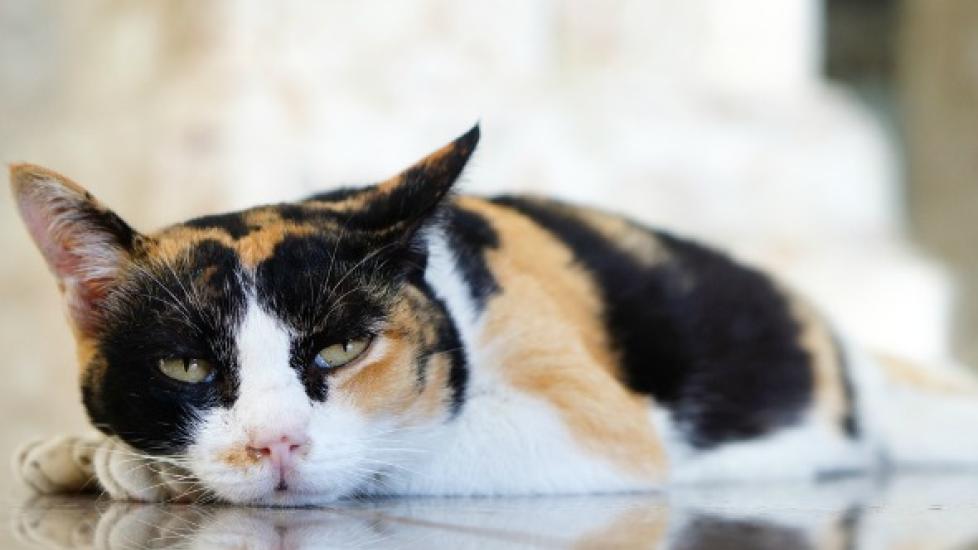Low Blood Potassium in Cats
Hypokalemia in Cats
A cat with abnormally low concentrations of potassium in the blood is said to have hypokalemia. A vital element to an important group of blood minerals called electrolytes, potassium functions in both cellular and electricual functions, such as in the conduction of electrical charges in the heart, nerves, and muscles. Therefore, lower levels of potassium in the bloodstream will compromise the normal functioning ability of these tissues.
Potassium is a vital element of both electrical and cellular functions. It belongs to an important group of blood minerals called electrolytes, which means it can carry small electrical charges. This primary positive ion is found within the cells and has a very important role in maintaining normal fluid levels within the cells and normal functions of many of the other enzymes within cells. Being an electrolyte that can carry a charge, potassium serves an important function in the conduction of electrical charges in the heart, nerves and muscles.
Symptoms and Types
Symptoms relate to the underlying cause of hypokalemia. Some of the more common ones include:
- Vomiting
- Lethargy
- Lack of appetite
- Weight loss
- Muscle pain
- Loss of muscle mass
- Generalized muscular weakness
- Downward dropping of neck
- Paralysis of muscles involve in respirations, causing difficulty in breathing
- Increased urination (polyuria)
- Increased thirst (polydipsia)
Causes
- Potassium loss through urine
- Chronic kidney disease
- After administration of drug meant to increase urine output
- Patients on dialysis
- Increased loss through urine after administration of intravenous fluids
- Metabolic diseases
- Vomiting
- After use of certain antibiotics
- Loss of potassium through feces, such as with diarrhea
- Intestinal obstruction
- Insufficient potassium intake
- Prolonged loss of appetite or starvation
- Diet deficient in potassium
- Insulin administration
- Glucose administration
- Stress induced
Diagnosis
You will need to give a detailed history of your cat's health, the onset and nature of the symptoms, and possible incidents or conditions that might have led to this condition.
Your veterinarian will perform a thorough physical exam to evaluate all body systems. Routine blood tests, including a complete blood count, biochemistry profile, and urinalysis are important for the diagnosis of hypokalemia and its underlying cause. In chronic kidney failure patients, blood tests may reveal normochromic (hemoglobin contents of RBCs are normal), normocytic (overall hemoglobin levels are decreased), and nonregenerative (bone marrow responding inadequately to the increased demand of RBC) anemia.
Higher levels of blood urea nitrogen (waste products [urea] in the blood that are normally excreted in the urine and voided from the body) and creatinine may also be found in patients with hypokalemia due to kidney failure. Urinalysis may reveal inadequate urine concentrating ability in patients with chronic kidney failure. In diabetic patients, the urinalysis may reveal high glucose levels and ketone bodies in urine.
Abdominal X-rays, ultrasound, computed tomography (CT-Scan), and magnetic resonance imaging (MRI) may also be used to diagnose the underlying cause of hypokalemia.
Treatment
Your cat may need to be hospitalized if its condition is severe enough to warrant an emergency. The initial treatment includes supplementation of potassium and treatment to stabilize dangerous symptoms like irregular heart beating and paralysis of respiratory muscles. Once your cat has been stabilized, maintenance dosages of potassium will be administrated. Once the underlying disease has been diagnosed, it can be treated to prevent another episode of hypokalemia.
Living and Management
Your cat's potassium levels may need to be measured every 6 to 24 hours during the initial phase of treatment. Call your veterinarian if you see any change in symptom at home during treatment.
